-
About
- About Listly
- Community & Support
- Howto
- Chrome Extension
- Bookmarklet
- WordPress Plugin
- Listly Premium
- Privacy
- Terms
- DMCA Copyright
- © 2010-2025 Boomy Labs

 FortyNinth Shelf
FortyNinth Shelf
Listly by FortyNinth Shelf
We asked 150 noted Canadian authors to write about their favourite Canadian book, and their generosity was astounding. This list represents not only 150 great ideas for a next read, but also such beautiful writing that you'll want to discover – or rediscover – the books of contributors themselves.
Please use the built-in tools below to comment and to share the list or some of its books with friends, and be sure to check in with 49thShelf (on Twitter at @49thShelf, on Instagram at @49thshelf_Reads, on FB at @49thShelf, and on our website of course: 49thShelf.com) for constant inspiration to run to your nearest bookstore.
49thShelf.com is the largest collection – and celebration! – of Canadian books on the Internet, with more than 100,000 titles in the database, a regular and very awesome blog, and tons of ways to make lists and share recommendations with friends.
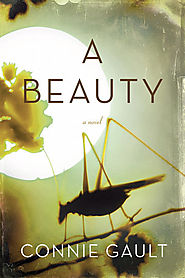
Connie Gault's new novel, A Beauty, is a beauty from the first page to the last. It’s set in the Dirty Thirties, that decade of drought and hard times in Saskatchewan. It wasn’t only the wheat that shrivelled. So did the human spirit. Gault takes us into the minds and hearts of several small-town people trying to break through despair and the narrowing of their days into some kind of wonder. All of her minor characters are touching and memorable. The heroine, Elena, a beautiful young woman who runs off from a country dance with a stranger, shatters the quotidian and changes the lives of several people as she journeys through the prairies to Ontario.
Gault is a genius. Her prose is tough and lyrical, her wisdom startling. Gault is known mainly as a short-story writer and a playwright; this book is a triumph. I rarely read books twice because there are so many novels I haven’t started yet. This one I’m going to read again.
An Officer of the Order of Canada, Lorna Crozier is a Governor-General Award winning author of sixteen books of poetry, the most recent being What the Soul Doesn’t Want. She has also written for children and her memoir, Small Beneath the Sky, is one of the 100 books Amazon claims you must read in your lifetime.
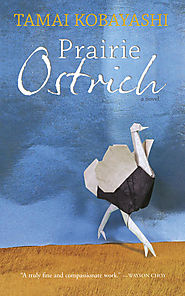
Prairie Ostrich is the kind of novel you want your friends and your book club to read so you can talk about everything. It’s the story of Egg Murakami, a Japanese-Canadian girl whose family owns an Ostrich farm in the small town of Bittercreek, Alberta. While the novel is set in the 70s, Kobayashi’s story is both current and universal. It’s the story of two sisters navigating the perils of adolescence as the family struggles under the shadows of loss and isolation. Prairie Ostrich conveys the bewilderment of Canadian culture through the eyes of a hopeful, compelling outsider with writing that employs the kind of carefully constructed prose that characterizes great Canadian novels.
Jael Richardson is the author of The Stone Thrower and the founder and Artistic Director of the Festival of Literary Diversity (FOLD).
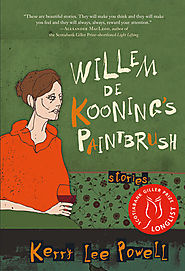
Set in grody strip clubs and greasy spoons, peopled with “tramps and lunatics,” “an assortment of creeps and lowlifes with bad breath,” battered girlfriends, and Soviet-scarred chamber maids, this energetic collection presents a “raw humanity defiantly festive in the face of poverty and despair.” Powell, also a poet, is a painterly prose writer, not just in her many references to visual art, but her gorgeous images. What makes this book so striking is how Powell sets up certain expectations, then, like the roller coaster in the title story, banks sharply and plunges us into an entirely unexpected narrative. The hilarious one-liners contribute a tonal juxtaposition that adds to the surprise.
“So many awful things happen when you’re not even looking,” Powell writes. So true! But the grim material in these stories is leavened by dark comedy, the author’s hard-boiled irreverence, her dazzling prose, and, miraculously, an undercurrent of comic book and fairy tale enchantment. The way you look at life determines how you’ll get through it. Powell stares right into the grimy places and whoops.
Caroline Adderson is an award-winning author of novels, short stories, and books for young readers.
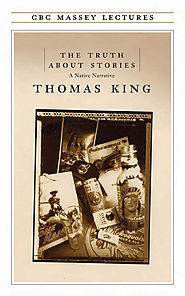
In this gorgeous nonfiction book, "King weaves his way through literature and history, religion and politics, popular culture and social protest, gracefully elucidating North America's relationship with its Native peoples." Grown out of the CBC Massey Lectures Series, the book has all the ease of an intimate talk out in the back yard. Like your grandfather who lived a few dozen lives, The Truth About Stories is both sophisticated in its analysis and practical in its approach.
I've found it to be a great teaching tool if you want your students to think about how we structure a story. King takes many approaches in each chapter, but my favourite is how fluidly he has a story within a story, sometimes within another story—three stories deep—to illustrate a point or two or three.
The Truth About Stories also taught me a great deal about how perspective works: how perspectives can change within a book, how the writer builds a narrator, how narrators and writers appear in and out of a reader's consciousness, how our relationship to the narrator evolves, moving between intimacies, weaving what's familiar and known with the unfamiliar or unknown, then looping back again. Every chapter was a joy and a challenge. Every chapter is enviable.
Michael V. Smith's most recent book is Bad Ideas, out with Nightwood Editions.
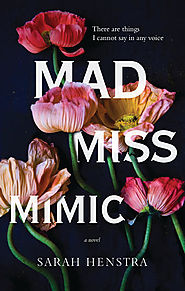
Readers of adult literary fiction might not have heard about this lovely book, because it’s officially published as teen and YA fiction. I recommend it to older readers, too! I loved getting lost in this subtle thriller about London in the 1870s, when the city was experiencing violent terror attacks and opium fever. This historical page-turner has everything: compelling characters, a love story, mystery, and danger. It’s such a pleasure to read. And once you see the connection to what’s happening with contemporary opioids, it also feels remarkably relevant.
Sarah Selecky wrote This Cake Is for the Party, and is the founder of Story Is a State of Mind School.
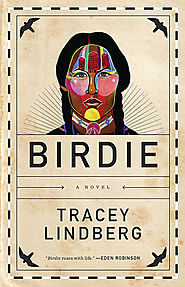
As someone who aims to be an ally to our Indigenous community, I don’t celebrate Canada’s 150th anniversary. Instead, I celebrate Indigenous resilience despite more than 150 years of genocide. That said, I choose to uplift the voices of authors who speak of the process of decolonization during this critical time of unlearning. Birdie, by Tracie Lindberg, follows the footsteps of Bernice who navigates the difficult terrain of survival and healing while searching for her identity and a sense of home. I am a survivor myself, and I have never read a book that captures so perfectly the act of disassociation as a means of processing trauma. I am ever grateful for this novel for its dark humour and its fearless portrayal of rebuilding one’s self in the face of oppression, brick by brick.
Catherine Hernandez is the award-winning author of Scarborough and M is for Mustache: A Pride ABC book.
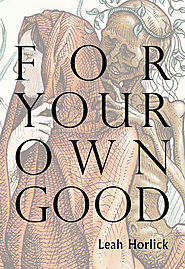
I bought this poetic memoir because of the cover, featuring a gorgeous, creepy illustration by Thomas Shahan. It turns out to foreshadow the dark material within. I’m not an expert on poetry. I can’t tell you how a poem does what it does. I can only tell you the effect it has on me. Horlick’s collection of forty-nine poems grabbed me by the gut. Five poems in, I was pressing my lips together, afraid for the narrator, tense with foreboding. For Your Own Good unveils an account of abuse both devastating and redemptive. I almost hate to tell you that because part of the power for me in this collection was discovering the truth of it. Within the queer community, the word is this is an important book because it breaks the silence about something that’s been hidden out of fear and a sense of allegiance. But anyone who’s ever been in an exploitative relationship can relate. And everyone else can savor this bold, brave book, one striking poem after another.
Tricia Dower is the author of the Shakespeare-inspired collection Silent Girl and the novels Stony River and Becoming Lin.
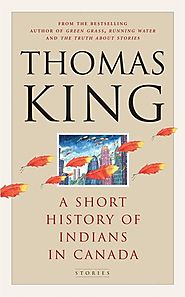
The history of Indigenous people in Canada isn’t short and any consideration of Canada 150 should include the sesquicentennial-bursting millennia of Indigenous experience, but even if we weren’t talking Canada 150, I’d recommend Thomas King’s short stories and especially, the dark incisive wit of A Short History of Indians in Canada. These stories—formally inventive, inventively ironic—skewer notions of the representation of Indigenous peoples. They are at turns hilarious, biting, tender, and virtuoso. King’s magic realist storytelling riffs off both postmodernism and Indigenous oral tradition, and nothing is more postmodern and magic realist than a Coyote story. The inversions and substitutions in these stories satirize, illuminate and entertain with their dark humour. A white baby is a bingo prize after mysteriously being mailed to a First Nations’ band office. A tourist is taken out to watch as migrating Indigenous people fly over Toronto like the once great flocks of now extinct birds. A crew cleans up the bodies of those who fly into Bay St. office towers. These stories remind us that Canada isn’t limited to the short and narrow conventions of mainstream European realism but is open to the imaginations and world views of all the people here.
Gary Barwin is the author of the Scotiabank Giller Prize-shortlisted bestseller, Yiddish for Pirates.
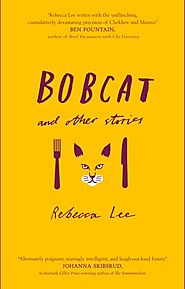
This book made me want to set my novel at a university in the 80s, or an architecture retreat in Wisconsin. Or maybe it made me want to be a university student in the 80s/young architect in Wisconsin. I haven’t had enough time to read lately, so I have come to treat books as nightcaps—a wee dram before bed. Well Bobcat had me binge-reading until two or three in the morning. Every word is exactly where it should be, the dialogue pert, the characters so honest and flawed. I wanted an invite to the dinner in the title story. To eat trifle in Manhattan. Or milk a cow. Or collect fish heads for the pigs’ slop bucket. That’s how good this book is. I wanted to climb inside it.
Eliza Robertson’s debut novel, Demi-Gods, comes out in September with Hamish Hamilton.
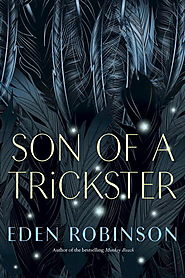
I loved this book because I learned about what life might be like in a particular community that I’ve never been to. But at the same time, Robinson writes such powerful emotional truth that I felt like I was reading about my own family.
Claire Cameron is the author of The Bear and The Last Neanderthal.
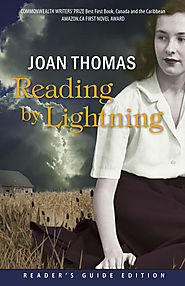
The sweeping story of Lily Piper, which I can’t help but compare to Ian McEwan’s Atonement (in all the best possible ways), divides its time between the Manitoba farm of her family and fate, and England, which—despite being wartime—offers delicious possibilities. The novel’s careful pacing ensures its strength and nerve last until the final bell.
Kerry Ryan is the author of the poetry collections The Sleeping Life and Vs.
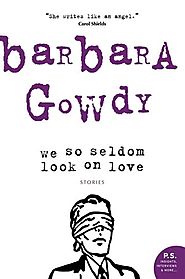
In a story collection that treads true Gowdy territory, a diverse collection of unconventional characters are thrust into strange and occasionally comical situations. The author bravely takes us to the very fringes of acceptable behaviour and challenges our notions and norms with deft skill and zero shame.
Stacey May Fowles is the author of Infidelity and Baseball Life Advice.
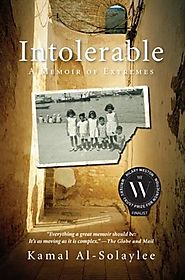
Part coming-out memoir, part chronicle of the rise of religious extremism in the Middle East, Intolerable is both utterly familiar and achingly inconceivable. I could see myself in young Kamal, a sensitive boy who loved his mother and who became fascinated with Western music and pop stars. But as the world he lived in started to drastically change—and his family gets displaced from Yemen to Lebanon to Egypt and back—it became clear he would need to find a way to leave those he loved behind in order to live openly and freely as a gay man. Intolerable is an important and courageous account of staying true to oneself in the face of an increasingly harsh and oppressive world.
Christopher DiRaddo is the author of The Geography of Pluto.
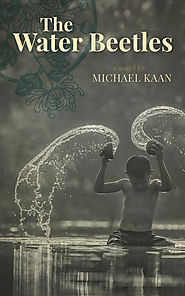
I first read The Water Beetles, Michael Kaan’s debut novel, earlier this year, and was astonished by the calm and measured clarity of his prose, the depth of feeling he brings to his narrative, and the assurance with which he presents the point of view of his hero, 12-year-old Chung-Man. The story has its origins in Kaan’s grandfather’s experiences of the Japanese occupation of Hong Kong and mainland China during the Second World War, but it is far more than a straightforward retelling of one boy’s struggles and suffering. Kaan never resorts to brutal descriptions of the very real horrors of the occupation, and his narrative is all the more powerful and affecting for it. With delicacy, precision, and no small amount of grace, Kaan illuminates a corner of the deadliest war in human history, and ably demonstrates the worth, the weight, and the enduring significance of our shared past.
Jennifer Robson is the author of Goodnight from London, After the War Is Over, and Somewhere In France.
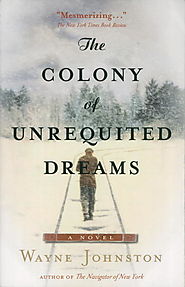
Newfoundland has always produced some of our best writers. Here Johnston uses his province’s storm-wracked history, and the real-life politician Joey Smallwood as his main character, to illuminate the island’s decision to become part of Canada.
Charlotte Gray is an award-winning historian and the author of The Massey Murder: A Maid, Her Master And The Trial That Shocked the Nation.
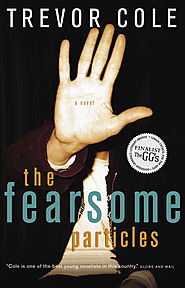
I found this book so immaculately written, the language so crystalline, that for me it hummed with intelligence and became a sanctuary from the world’s inane moments as I read. I admired Cole’s ability to repeatedly plant in the story a seemingly innocuous seed which grows underground and bursts on the scene later with huge tragicomic implications. There is a wonderful complicity with the reader and I love that feeling of being included in the narrator's beleaguered confidence.
Kathleen Winter is the author of Annabel, Boundless, and The Freedom of American Songs.
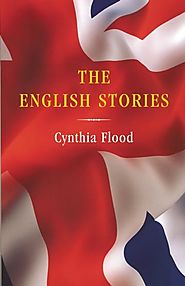
As a novelist, I am always in awe of writers who capture an entire world in a short story. Cynthia Flood is one such writer and each of the stories in The English Stories is a gem of concise, spare prose, compassionate observation and sly humour.
Nancy Richleris the author of The Imposter Bride.
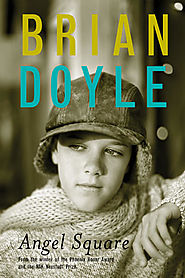
My dad gave me a copy of Brian Doyle’s Angel Square when I was about eleven years old. I still have the same copy, yellowed with shredded spine and greasy peanut butter drips on page 56. I must have read the book dozens of times, but it was not until I moved to Ottawa a few years ago, where Doyle’s young-adult novel is set, that I felt the impact this book has had on my literary sensibility. As I got to know Ottawa, and likewise revisited Angel Square, I was astonished by the fluidity of Doyle’s prose, the strength of his narrator’s voice, and the subtlety with which he deals with racism, religious conflict, and xenophobia in post World War Two Canada. The comic-book subtext lends the book a contemporary feel, while the humour and sensitivity of the narrator, Tommy, resonates with valuable lessons and observations that speak to readers of all ages, not just “young adults.” Angel Square is a gem.
Nadia Bozak is the author of the novels Orphan Love and El Niño, the first two parts of her Border Trilogy, as well as the acclaimed short story collection, Thirteen Shells.
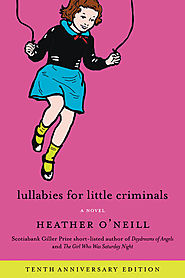
I didn’t start out as a fiction writer. I started out as a poet—and in my transition to writing short stories, almost no book informed my writing on a sentence level as much as Heather O’Neill’s Lullabies for Little Criminals. O’Neill’s remarkable gift for image means that any given page contains line after line of what I’d call micro-stories: each sentence bringing an image to life so vividly that the sentence seems to be a story in itself.
Lullabies begins in a foster home outside Montreal. Twelve-year-old narrator Baby has grown up in the care of her heroin-addict, single father Jules—now she’s in care waiting out Jules’ tuberculosis treatment. With his recovery, the two are reunited, but things quickly fall apart again: Jules’ addiction defines their relationship, allowing him moments of true tenderness that punctuate a more everyday baseline of abuse.
O’Neill exposes all the cruelty and yearning that can come with a certain kind of love, and Lullabies is a coming-of-age story of a different colour: intensely honest, intensely Montreal, absolutely heartbreaking yet piercingly funny. Baby’s longing to be out of childhood—and to achieve her father’s love as a peer—leads her to roam the streets, where she inevitably falls prey to other abuses, and yet the novel somehow manages to hit readers with a double shot of what can feel like pure optimism—even if delivered in a kind of broken, candy-coated shell.
Elisabeth de Mariaffi is the author of the Giller-nominated short story collection How to Get Along With Women and the literary thriller The Devil You Know.
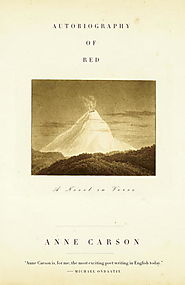
In The Autobiography of Red, Carson built a magical world on the bones of myth and wrapped it all up in a coming of age story. She takes a dizzying pace, fresh and true and heart-wrenching. In myth, the winged red monster Geryon was slain by Herakles while completing his tenth labour. Here, the red monster is a moody, intelligent young man, abused and yearning, while Herakles is the handsome tormentor who breaks his heart. And that’s just how the story begins.
You don’t need to like poetry to enjoy Autobiography of Red. I have found it to be excellent gateway poetry for the reticent. This is a very good story told in beautiful, precise, nourishing language. If you’ve already read it, it’s probably time to revisit. It’s that good.
Teva Harrison is a writer and graphic artist. She is the author of the critically acclaimed graphic memoir, In-Between Days, which is based on her graphic series about living with cancer published in The Walrus.
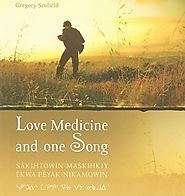
If love is our last hope, the Mi’kmaq Medicine Wheel is my compass. The wheel contains four colours—red, white, yellow and black—they represent four races, as well as the four directions. Each direction is associated with a spirit helper, an element, and a sacred medicine. Like the medicine wheel, Gregory Scofield’s beautiful poetics shows us: love is the only medicine.
Our lives move in circles. We are sun-wise. In Scofield’s poetry collection, Love Medicine and One Song, he honours the earth and textures with poems like, “No Language,” “Offerings,” and “Five Images,” poetics of desire, tradition and queerness. Identities intertwine, especially if you can’t be seen as Indigenous. Poetry is embodiment, a space to claim. Scofield’s poetics draw on overlapping identities, which braid together. Simple descriptions of Métis, gay, or Jewish don’t entirely fit. These backgrounds are as contradictory and filled with tension as any word or definition. Gregory Scofield’s Love Medicine and One Song notes: we are all poems.
Shannon Webb-Campbell is a Mi’kmaq poet. Still No Word (Breakwater 2015) won Eagle Canada’s Out In Print Award.
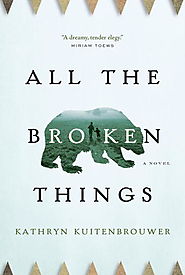
All the Broken Things will be a shock to readers for whom only draft dodgers come to mind when they think about Canada’s relationship to the Vietnam War. Kathryn Kuitenbrouwer has a more unsettling story to tell as she introduces us to Bo, a boy living in Toronto with his family in the early 1980s after fleeing Vietnam at the war’s end. Life in Canada brings Bo face to face with hardship, racism, and the lasting effects of Agent Orange, a chemical that was manufactured in Ontario and used by the US military in Vietnam to devastating effect, not least on the very people Bo loves.
It’s sober stuff, but All the Broken Things has magic to go with its heartache. The enchantment begins when Bo is drawn into performing as a bear wrestler on the local carnival circuit. It continues when he and a young bear he’s training run away together to live as fugitives in Toronto’s parklands. And somehow along the way, the novel manages to become a retelling of the Orpheus myth, too.
While All the Broken Things is by no means the first contemporary Canadian novel about the Vietnam War’s legacy, it’s one of the most distinctive, and perhaps the most committed to revisiting Canada’s part in the war with a critical eye. It’s a book to make you think. As we follow Bo in his trials, his passions, and his feverish loyalty to intimates both human and ursine, Kuitenbrouwer’s story also ends up getting you right in the gut.
Robert McGill's new book, War Is Here: The Vietnam War and Canadian Literature, will published in Fall 2017.
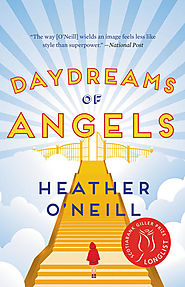
Heather O’Neill’s Daydreams of Angels is a gorgeous short story collection. Each story is full of the remarkable metaphors, brilliant descriptions, and the beating heart that is always quintessential O’Neill. The collection is like fairy tales for adults. There is the story of a young boy, Michal, who is inspired to read and have confidence in his individuality by his single mom’s ex-boyfriend, Lionel. There is the story of three characters linked by the name Ferdinand—a young boy who decides to be a boxer, an old man whose only companion is his beloved dog, Ferdinand, and my favourite, Isabelle Ferdinand, a brainy, idiosyncratic teenager who changes her mind about losing her virginity at a party.
The title story is incredibly beautiful and heart shattering. It is full O’Neill’s unique, signature humour: “It was a shame to have to use the cherubim, the angels that were normally in charge of romantic love. They were so sleazy and ridiculous. But what else could God do that day?” It also pokes gently and sensitively at our concepts of religion, our consideration and control over life and death. It describes lovely, kind Yvette Olivier on her last night. The final lines of the story—“She looked as if she was still alive and having the most fantastic dream of her life. She looked as if she was about to burst out laughing”—make me cry every time I read them. I can’t recommend Daydreams of Angels highly enough.
Danila Botha is the author of For All the Men (and Some of the Women) I've Known, a finalist for the Trillium Book Award.
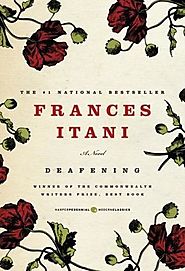
What is remarkable about Frances Itani’s novel of small-town Ontario and the First World War is its depiction of deafness. The heroine, Grania, loses her hearing in early childhood after a bout of scarlet fever, and the novel follows her from the age of five to adulthood, when she marries a hearing man who goes off to the front. Through its description of confusion and isolation, of lip reading and sign language, and most especially of silence, Deafening actually made me feel what it might be like to be deaf.
Grania triumphs over the fears and frustrations of her childhood when she attends the Ontario School for the Deaf in Belleville and from there the novel moves to an equally engrossing description of the Western Front where her new husband works as a stretcher bearer. As I read, I assumed that the deaf Grania would somehow voyage to the noise of the guns—that her story would directly and dramatically intersect with that of the war. But she stays back in Deseronto, waiting for her man. I came to realize that was a more honest solution, true to the reality of the home front and to the resolute character Itani had created.
Toronto novelist and cultural critic Kate Taylor is the author of Serial Monogamy.
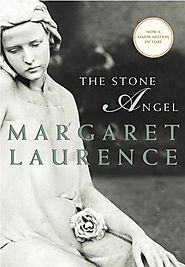
What does it say about a book when a character, a ninety-year-old woman, is alive for the reader decades later? For me, it says it’s a classic worth recommending. The Stone Angel, by Margaret Laurence, introduced me to one of the most memorable characters in modern literature—crotchety, sharp-tongued Hagar Shipley, the person no one wants to be when they grow up.
It’s wonderful, and rare, when a novel changes the way you look at the world, as this book did for me. Paralleling past and present, with prose that is startling and evocative, Hagar becomes so fully-real that her joyless life hits like touching a live wire. Near the end, Hagar reflects, “I must always, always, have wanted that—simply to rejoice. How is it I never could?” Hagar runs, but realization and redemption come a little too late for her. Me? Every time I remember this character I adjust my bearings and head toward joy.
Heather Tucker’s critically acclaimed debut novel is The Clay Girl.
